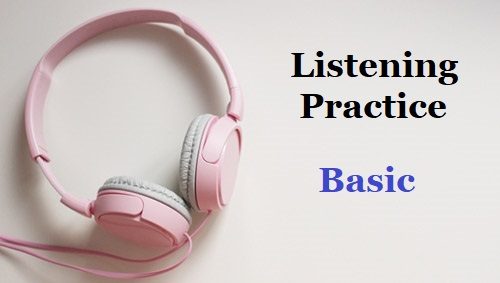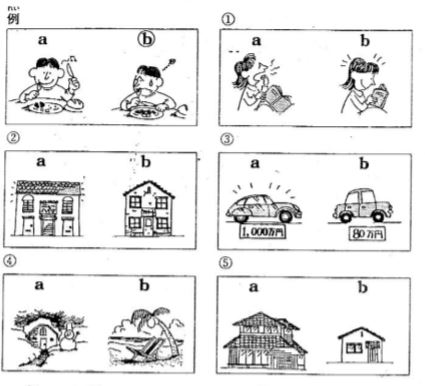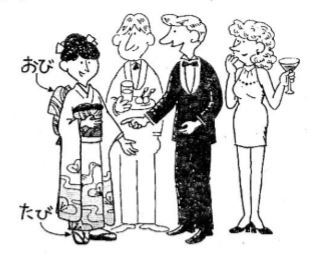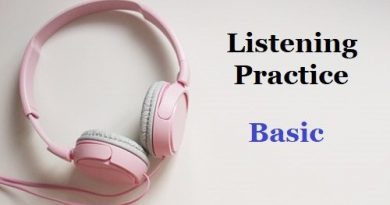Japanese basic listening practice lesson 7
Hello everyone! Today Learn Japanese Daily will introduce to you the Japanese basic listening practice lessons. Let’s start with : Japanese basic listening practice lesson 7

Contents
- 1 Lesson 7 : きれいですね。(Kirei desu ne.) : It’s beautiful.
- 1.1 1. 会話を聞いて、正しい絵を選んでください。 Kaiwa o kiite, tadashii e wo erande kudasai. Choose the appropriate adjectives a or b as in the example.
- 1.2 2. 例のように選んでください。そのあとで確かめてください。 Rei no youni erande kudasai. Sono ato de tashikamete kudasai. Choose the appropriate adjectives. Circle a or b as in the example.
- 1.3 3. 会話を聞いて質問に答えてください。はじめに質問を読んでください。 Kaiwa wo kiite shitsumon ni kotaete kudasai. Hajimeni shitsumon wo yonde kudasai. Write your answers in the blanks.
- 1.4 4. ひらがなで書いてください。 Hiragana de kaite kudasai. Fill in the blanks using hiragana.
Lesson 7 : きれいですね。(Kirei desu ne.) : It’s beautiful.
1. 会話を聞いて、正しい絵を選んでください。
Kaiwa o kiite, tadashii e wo erande kudasai.
Choose the appropriate adjectives a or b as in the example.

Script and answer
例:田中さん、その料理はおいしいですか。——— いいえ、あまりおいしくないです。
Tanaka-san, sono ryouri wa oishii desuka. –> iie, amari oishikunai desu.
Mr. Tanaka, is that dish delicious? –> No, it is not very good.
① アンナさん、その本はおもしろいですか。———ええ、とてもおもしろいです。
Anna-san, sono hon wa omoshiroi desuka. –> ee, totemo omoshiroi desu.
Anna, is that book interesting? –> Yes, it’s very interesting.
② 木村さん、あなたのアパートは新しいですか。———いいえ、新しくないです。とても古いですよ。
Kimura-san, anata no apaato wa atarashii desuka. –> iie, atarashikunai desu. Totemo furui desu yo.
Kimura, is your apartment new? –> No, it isn’t. It’s very old.
③ ジョンさん、あなたの車は高いですか。———いいえ、あまり高くないです。
Jon-san, anata no kuruma wa takai desuka –> iie, amari takakunai desu.
Mr. John, is your car expensive? –> No, it is not very expensive.
④ ヤンさん、あなたの国は今、寒いですか。———ええ、とても・・・。
Yan-san, anata no kuni wa ima, samui desuka. –> ee, totemo…
Yan, is it cold in your country now? –> Yes, it’s very cold.
⑤ 山田さん、あなたの家は大きいですか。———いいえ、あまり・・・。
Yamada-san, anata no ie wa ookii desuka. –> iie, amari…
Ms. Yamada, is your house big? –> No, it is not very big.
Answer
1-b 2-b 3-b 4-a 5-b
2. 例のように選んでください。そのあとで確かめてください。
Rei no youni erande kudasai. Sono ato de tashikamete kudasai.
Choose the appropriate adjectives. Circle a or b as in the example.
例 (Answer a)
a. にぎやかな町です
b. 元気な町です
①
a. 長いですね
b. とおいですね
②
a. 便利なところにありますね
b. きれいなところにありますね
③
a. さむいです
b. つめたいです
④
a. ちいさいですね
b. みじかいですね
⑤
a. 高い試験ですよ
b. むずかしい試験ですよ
Script and answer
例
男:休みの日にどこへ行きますか。
女:よく新宿へ行きます。
男:新宿はどんな町ですか。
女:とても<新宿はとてもにぎやかな町です。>
otoko : yasumi no hi ni doko e ikimasuka.
onna : yoku Shinjuku e ikimasu.
otoko : Shinjuku wa donna machi desuka.
onna : totemo <Shinjuku wa totemo nigiyaka na machi desu.>
Man : Where do you go on your holiday?
Woman : I often go to Shinjuku.
Man : What kind of town is Shinjuku?
Woman : It’s very <Shinjuku is a very busy town.>
①
男:マリアさん、お国はどちらですか。
女:ブラジルです。日本から飛行機で20時間ぐらいです。
男:そうですか。とても<ブラジルはとても遠いですね。>
otoko : Maria-san, okuni wa dochira desuka.
onna : Burajiru desu. Nihon kara hikouki de nijuu jikan gurai desu.
otoko : Soudesuka. Totemo <Burajiru wa totemo tooi desu ne.>
Man : Maria, where are you from?
Woman : I’m from Brazil. It takes about 20 hours to get there from Japan by plane.
Man : Really? It’s very <Brazil is very far, isn’t it?>
②
男:ラタナさんのマンションはどこですか。
女:わたしのマンションは駅の前です。会社まで電車で10分です。
男:へえ、ラタナさんの家はずいぶん<ラタナさんの家はずいぶん便利なところにありますね。>
otoko : Ratana-san no manshon wa doko desuka.
onna : watashi no manshon wa eki no mae desu. Kaisha made densha de juppun desu.
otoko : hee, Ratana-san no ie wa zuibun <Ratana-san no ie wa zuibun benri na tokoro ni arimasu ne.>
Man : Ratana, where is your apartment?
Woman : My apartment is in front of the station. It takes 10 minutes to get to the company from my apartment by train.
Man : Really? Your house is quite <Your house is in a convenient place.>
③
男:フーフー、このコーヒーはとても熱いです。そのジュースはどうですか。
女:(ジュースを飲む音)ああ、おいしい。このジュースはとても<このジュースはとても冷たいです。>
otoko : fuufuu, kono koohii wa totemo atsui desu. Sono juusu wa doudesuka.
onna : (juusu wo nomu oto) aa, oishii. Kono juusu wa totemo <Kono juusu wa totemo tsumetai desu.>
Man : This coffee is very hot. How is that juice?
Woman : (Sound of drinking juice) Oh, it’s delicious. This juice is very <This juice is very cold.>
④
女:すみません。赤い靴はありますか。
男:いらっしゃいませ。お客さまの靴ですか。この靴はいかがですか。
女:そうですね。あ、痛い。これはちょっと<この靴はちょっと小さいですね。>
onna : sumimasen. Akai kutsu wa arimasuka.
otoko : irasshaimase. Okyakusama no kutsu desuka. Kono kutsu wa ikaga desuka.
onna : soudesune. A, itai. Kore wa chotto <Kono kutsu wa chotto chiisai desu ne.>
Woman : Excuse me. Do you have red shoes?
Man : Welcome. Are they for you? How about these shoes?
Woman : Well, oh, it hurts. These shoes are a bit <These shoes are a bit small.>
⑤
男:皆さん、あした、日本語の試験があります。
女:先生、どんな試験ですか。やさしいですか。
男:いや、ちょっと、<ちょっと難しい試験ですよ。>
otoko : minasan, ashita, Nihongo no shiken ga arimasu.
onna : sensei, donna shiken desuka. Yasashii desuka.
otoko : iya, chotto, <Chotto muzukashii shiken desu yo.>
Man : Everyone, there is a Japanese test tomorrow.
Woman : Teacher, what kind of test is it? Is it easy?
Man : No, it’s quite <It’s a bit difficult.>
Answer
1-b 2-a 3-b 4-a 5-b
3. 会話を聞いて質問に答えてください。はじめに質問を読んでください。
Kaiwa wo kiite shitsumon ni kotaete kudasai. Hajimeni shitsumon wo yonde kudasai.
Write your answers in the blanks.

① きょうのパーティーはどんなぱですか。
______パーティーです。
② けい子さんの着物はどんな着物ですか。
______着物です。
③ おびは軽いですか。
いいえ、______ないです。ちょっと______です。
④ たびはどんな色ですか。
______です。
Script and answer
男:今日のパーティーはにぎやかですね。
otoko : kyou no paatii wa nigiyaka desu ne.
Man : This party is lively, isn’t it?
女:ええ、いろいろな国の人が来ていますね。
onna : ee, iroiro na kuni no hito ga kite imasu ne.
Woman : Yes, there are so many people from different countries.
男:けい子さん、今日は着物ですか。きれいですね。
otoko : Keiko-san, kyou wa kimono desuka. Kirei desu ne.
Man : Ms. Keiko, are you wearing kimono? How pretty.
女:ええっ、わたしが?着物が?
onna : ee-, watashi ga? kimono ga?
Woman : Huh, me or kimono?
男:着物も、けい子さんも。本当にきれいですね。これは何ですか。
otoko : kimono mo, Keiko-san mo. Hontou ni kirei desu ne. Kore wa nandesuka.
Man : Ms. Keiko and your kimono are very pretty. What is this?
女:これ?これはおびですよ。
onna : kore? kore wa obi desu yo.
Woman : This one? This is obi.
男:ふうん。重くないですか。
otoko : fuun. Omokunai desuka.
Man : Hmm. Isn’t it heavy?
女:ええ、ちょっと重いですね。
onna : ee, chotto omoi desu ne.
Woman : Yeah, it’s a bit heavy.
男:それじゃ、その白い靴下は?
otoko : soreja, sono shiroi kutsushita wa?
Man : What about those white socks?
女:これは靴下ではありません。たびです。
onna : kore wa kutsushita dewa arimasen. Tabi desu.
Woman : These are not normal socks. These are Japanese socks.
Answer
① にぎやかな
② きれいな
③ かるく、おもい
④ しろい(しろいいろ)
4. ひらがなで書いてください。
Hiragana de kaite kudasai.
Fill in the blanks using hiragana.
わたしの かぞくは 6にんです。おばあさん、おとうさん、おかあさん、おにいさんと わたしと いもうとです。おばあさんは 80さいですが、とても______です。ちちは いしゃです。まいにち______です。ははは とても______です。あには かいしゃいんです。______ひとです。いもうとは とても______です。
Script and answer
わたしの家族は6人です。おばあさん、お父さん、お母さん、お兄さんとわたしと妹です。おばあさんは80歳ですが、とてもげんきです。父は、医者です。毎日いそがしいです。母はとてもやさしいです。兄は会社員です。まじめな人です。妹はとてもかわいいです。
watashi no kazoku wa roku nin desu. Obaasan, otousan, okaasan, oniisan to watashi to imouto desu. Obaasan wa hachijuu sai desuga, totemo genki desu. Chichi wa, isha desu. Mainichi isogashii desu. Haha wa totemo yasashii desu. Ani wa kaishain desu, Majimena hito desu. Imouto wa totemo kawaii desu.
My family has 6 members. They are my grandmother, my parents, my elder brother, I and my younger sister. My grandmother is 80 years old, but she is very healthy. My father is a doctor. He is busy everyday. My mother is very kind. My elder brother is an office worker. He is a hard worker. My younger sister is very cute.
Above is : Japanese basic listening practice lesson 7. See other similar lessons at category : Japanese listening practice or Japanese basic listening practice
